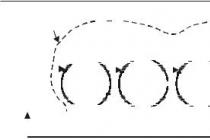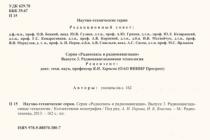Introduction
1. Orthoepy as a science
2. Development of Russian orthoepy
3. Variation of stress (accentological aspect)
4. Accentological options
Conclusion
List of used literature
Introduction
The relevance of this topic lies in the development and formation of modern trends in the Russian language and linguistics. Modern technologies make it possible to study this topic using new approaches.
The historical development of orthoepy, as one of the areas of linguistics, allows us to look for an answer to long-existing expressions (their correctness and incorrectness of pronunciation).
The invasion of Rus' by enemies was the cause of drastic changes in the pronunciation and spelling of words and phrases. Much during the historical period of development was erased by time and irrelevant; Russian reforms made it possible to more actualize the Russian language and unify its composition.
The modern Russian language, which has a long historical basis, should reflect both words from European languages and a historical basis.
The purpose of this work is to trace the development of orthoepy and accentology; and also determine what problems these disciplines study.
1. Orthoepy as a science
Each literary language exists in two forms - oral and written - and is characterized by the presence of mandatory norms - lexical, grammatical and stylistic. At the same time, the written form of the language is also subject to spelling and punctuation norms (i.e., spelling rules), and the oral form is subject to pronunciation, or orthoepic, norms.
The word orthoepia is of Greek origin: orthos - correct, epos - speech. It denotes both a set of pronunciation rules and the science that studies these rules. Orthoepy is the study of the norms of oral speech: the rules of pronunciation of individual sounds and their combinations, the patterns of stress placement.
Good literary pronunciation is one of the important indicators of the general cultural level of a modern person. “The correct pronunciation of a word is no less important than the correct spelling. It is known that incorrect pronunciation distracts the listener’s attention from the content of the statement, thereby complicating the exchange of information... The role of correct pronunciation has especially increased in our time, when oral public speech at meetings and conferences, on radio and television has become a means of communication between thousands and millions of people "
It is especially important to disseminate correct Russian literary pronunciation, since the Russian language is not only the language of the Russian people, but also a means of interethnic communication of all peoples of Russia and one of the international languages of our time.
This is facilitated by special reference and teaching aids, scientific and popular science publications, and regular radio and television broadcasts. However, the central figure in the dissemination of spelling skills was and remains the school teacher. Therefore, a student at a pedagogical university himself must master the norms of orthoepy, clearly imagine in which direction the language norm is developing in the field of stress and pronunciation, and be able to distinguish variants of the norm from non-normative, incorrect pronunciation.
2. Development of Russian orthoepy
Russian literary pronunciation developed gradually, mainly on the basis of Moscow pronunciation norms. In the XIV century. Moscow became the center of the Russian state, therefore the pronunciation and many other norms of the emerging Russian literary language were formed on the basis of the Moscow dialect. The Moscow orthoepic norm was finally formed by the end of the 19th century. This was the pronunciation of the native Moscow intelligentsia.
By the second half of the 19th century. Petersburg pronunciation also formed. If Moscow pronunciation was based on the characteristic features of a living folk language and supported by theatrical tradition (the Maly Theater was the greatest authority in the field of Moscow pronunciation), then St. Petersburg pronunciation was characterized by the preservation of writing features in oral speech, bookishness, and “literalism.” In addition, the St. Petersburg pronunciation was affected by some features of the Northern Great Russian dialects, including the so-called ekanye. Petersburg pronunciation was not recognized by the theater and did not become a literary norm, but some of its features subsequently had a noticeable impact on the development of Russian literary pronunciation.
Before the Great October Socialist Revolution, the influence of the pronunciation skills of such large cultural centers as Kazan and Nizhny Novgorod on oral literary speech was also noticeable. Therefore, there were pronunciation variations, local differences in pronunciation, which prevented the unification of spelling norms.
After October, a change in the social composition of the Russian intelligentsia caused a temporary weakening of the culture of oral literary speech. However, as the masses of speakers mastered the literary language, as their general culture increased, they gradually acquired the pronunciation norms of the literary language. Currently, orthoepic norms have become more uniform, more unified than in the pre-October era. The number of pronunciation variants has decreased. All kinds of pronunciation “idioms” have disappeared or are gradually disappearing, that is, special pronunciation of individual words or their forms that do not correspond to the general orthoepic norms of the language. The most significant differences between Moscow and St. Petersburg (Leningrad) pronunciation have been erased. This happened due to the loss of many specific features of pre-revolutionary Moscow pronunciation.
The result was a convergence of Moscow and Leningrad pronunciation. When people nowadays talk about the “Moscow norm,” they mean the old, pre-October Moscow pronunciation. It was preserved in Moscow in the speech of the older generation of Muscovites back in the 20s and 30s. XX century, but in the post-war period it underwent intensive processing. Now even Moscow theater actors and radio and television announcers are noticeably moving away from specifically Moscow norms.
Some minor differences in the pronunciation of Muscovites and Leningraders still remain, but they are not regular and do not determine the nature of the pronunciation as a whole: in Moscow hiccups are more pronounced, in Leningrad ekanye is sometimes still found, cf.: [р'ие]ка and [р 'e]ka, [p'i e]middle and [p'e]middle; in Moscow, assimilative softening of consonants is more often observed: [z"d"e]s, [s"n"a]t; stronger is the reduction of vowels of non-upper rise: [gъл ^ ва], [gorъt].
In the speech of the inhabitants of the Volga region and the North, a rounded pronunciation may still be preserved.
However, these deviations from the literary norm are irregular and generally do not affect modern orthoepy.
Thus, the main pattern of development of pre-modern Russian orthoepics is the elimination of local pronunciation features, the establishment of uniform orthoepic norms for all speakers of the Russian literary language.
The unification of literary pronunciation occurs largely under the influence of writing: pronunciation in many cases becomes closer to writing. This is due to the strengthening of the social role of written speech in the conditions of universal literacy achieved in the Soviet Union. We learn many linguistic facts not from the oral speech of others, but from books and newspapers. The loss of specific features of the old Moscow pronunciation is primarily due to the influence of the graphic appearance of the word. This is the pronunciation of [l] after hissing (w) and [z] in the first pre-stressed syllable (heat, naughty, steps); the pronunciation of soft back-lingual ones before [i] in adjectives and verbs (quiet, flexible, strict; tap, scare away, wave) ; distinction in the pronunciation of the endings of the 3rd person of the plural of verbs of the 1st and 2nd conjugations (they will say, take out, lay, cackle, but hear, walk, praise, love); pronunciation of a solid long [zh:] in the roots of words ( reins, yeast, squeal); pronunciation of soft [s"] in the postfix -sya (-s) (decided, took, bathed).
Competent oral speech is the key to successful communication. The ability to correctly express your thoughts will help not only when applying for a job or in business negotiations, but also in everyday life. But in order to perfectly master oral speech, you need to know and follow the orthoepic norms of the Russian language. This is what our article will be devoted to.
What is orthoepy?
The word "orthoepy" consists of two Greek roots - "orthos" and "epos", which are translated as "correct" and "speech". That is, the science of correct speech is what orthoepy is.
Graphic abbreviations
Graphic abbreviations include initials next to the surname, designations of volume or distance, for example, liters (l), meters (m), also pages (s) and other similar abbreviations that serve to save space in printed text. When reading, all these truncated words must be deciphered, that is, the word must be pronounced in full.
The use of graphic abbreviations in a conversation can be assessed as a speech error or irony, which may only be appropriate in certain circumstances.
First names and patronymics
Orthoepic norms of the Russian language also regulate the pronunciation of names and patronymics. Note that the use of patronymics is typical only for our language. In Europe, such a concept does not exist at all.
The use of a person's full name and patronymic is necessary in various circumstances, both verbally and in writing. Such addresses are especially often used in work environments and official documents. Such an address to a person can also serve as a marker of the degree of respect, especially when talking with elders and elderly people.
Most Russian-language names and patronymics have several pronunciation options, which can vary, among other things, depending on the degree of closeness with the person. For example, when meeting for the first time, it is advisable to pronounce the interlocutor’s name and patronymic clearly, as close to written form as possible.
However, in other cases, the orthoepic norms of the Russian language (pronunciation norms) provide for the historically established method of use in oral speech.
- Patronymic names ending in “-evna”, “-evich”. In female versions, it is necessary to comply with the written form, for example, Anatolyevna. For men, a short version is also acceptable: Anatolyevich / Anatolyich.
- On “-aevich” / “-aevna”, “-eevich” / “-eevna”. For both male and female options, a short version is allowed: Alekseevna / Aleksevna, Sergeevich / Sergeich.
- On “-ovich” and “-ovna”. In the male version, contraction of the form is acceptable: Alexandrovich / Alexandrych. For women, full pronunciation is required.
- In female patronymics, formed from names ending in “n”, “m”, “v”, [ov] is not pronounced. For example, instead of Efimovna - Efimna, Stanislavovna - Stanislavna.

How to pronounce loanwords
Orthoepic norms of the Russian language also regulate the rules of pronunciation of foreign words. This is due to the fact that in a number of cases the laws of use of Russian words are violated in borrowed ones. For example, the letter “o” in unstressed syllables is pronounced the same way as if it were in a strong position: oasis, model.
Also, in some foreign words, the consonants preceding the softening vowel “e” remain hard. For example: code, antenna. There are also words with variable pronunciation, where you can pronounce “e” both hard and soft: therapy, terror, dean.
In addition, for borrowed words the stress is fixed, that is, it remains unchanged in all word forms. Therefore, if you encounter difficulties with pronunciation, it is better to turn to a spelling dictionary.
Accentological norm
Now we will take a closer look at the orthoepic and accentological norms of the Russian language. First, let's figure out what an accentological norm is. This is the name for the rules for placing stress in a word.
In the Russian language, stress is not fixed, as in most European ones, which not only enriches speech and increases the possibilities of language play, but also provides enormous opportunities for violating the accepted norm.
Let's consider the functions that a non-fixed accent performs. So here it is:
- provides an opportunity for stylistic coloring of words (Silver - Serebro) and the emergence of professionalisms (Kompas - Kompas);
- provides for a change in the etymology (meaning) of the word (melI - meli, Atlas - atlas);
- allows you to change the morphological features of the word (sosny - sosny).
Also, placing stress can change the style of your speech. So, for example, the word “maiden” will refer to the literary, and “maiden” will refer to the neutral one.
There is also a class of words in which the variability of stress does not carry any semantic load. For example, Butt - butt, barge - barge. The emergence of these exceptions is due to the lack of a unified norm and equal existence of the dialect and literary language.
Also, the placement of stress in some words may simply be an outdated form. For example, music is music, an employee is an employee. In essence, you are only changing the stress, but in fact you are starting to speak with an outdated syllable.
Most often, the placement of stress in a word has to be remembered, since existing rules do not regulate all cases. In addition, sometimes a violation of a literary norm can become an individual author's technique. This is often used by poets to make a poetic line sound smoother.

However, one should not assume that accentology is included in the orthoepic norms of the Russian language. Stress and its correct placement is too broad and complex a topic, so it is usually placed in a special section and studied separately. Those who want to familiarize themselves with the topic in more detail and eliminate violations of the norm of stress placement from their speech are recommended to acquire an orthoepic dictionary.
Conclusion
It would seem that what could be difficult about speaking your native language? In fact, most of us have no idea how many norms of the Russian language are violated every day.
Plan:
1. Orthoepy tasks.
2. Modern spelling standards.
3. Russian literary pronunciation and its historical foundations.
4. General and specific rules of orthoepy.
5. Deviations from pronunciation norms and their causes.
Orthoepy – This is a set of rules for pronunciation of words. Orthoepy (Greek orthos - straight, correct and eros - speech) is a set of rules of oral speech that establish uniform literary pronunciation.
Orthoepic norms cover the phonetic system of the language, i.e. the composition of phonemes distinguished in the modern Russian literary language, their quality and changes in certain phonetic positions. In addition, the content of orthoepy includes the pronunciation of individual words and groups of words, as well as individual grammatical forms in cases where their pronunciation is not determined by the phonetic system.
Orthoepy is a term that is used in 2 meanings:
1. A set of rules that establish the unity of pronunciation in a literary language (this is the rule of literary pronunciation).
2. A branch of linguistics adjacent to phonetics, which describes the theoretical foundations and norms of the literary language from the point of view of pronunciation. Oral speech has existed as long as human society. In ancient times and even in the 19th century. Each locality had its own pronunciation features - these were the so-called territorial dialect features. They have survived to this day.
In the 19th and 20th centuries, an urgent need arose for a unified literary language, including unified, general rules of pronunciation. Therefore, science began to take shape orthoepy. It is closely related to phonetics. Both sciences study spoken speech, but phonetics describes everything that is in oral speech, and orthoepy characterizes oral speech only from the point of view of its correctness and compliance with literary norms. Literary norm - This is a rule for the use of linguistic units. These rules are mandatory for everyone who speaks a literary language.
The norms of literary language develop gradually, and mastery of the norms is a difficult and complex task, which is facilitated by the widespread development of means of communication. The norms of the literary language, including pronunciation, are laid down at school. Oral literary speech has uniform norms, but it is not uniform. She has some options. There are currently three pronunciation styles:
1. Neutral (average) This is the usual calm speech of an educated person who knows literary norms. It is for this style that orthoepic norms are created.
2. Book style (nowadays rarely used in scientific oratorical introductions). This is characterized by increased clarity of pronunciation.
3. Colloquial literary style. This is the pronunciation of an educated person in unprepared situations. Here it is possible to deviate from strict rules.
Modern pronunciation developed gradually over a long period of time. The basis of modern pronunciation is the Moscow dialect. The Moscow dialect itself began to be created in the 15th-16th centuries, and in general terms took shape in the 17th century. In the 2nd half of the 19th century, a system of pronunciation rules was developed. Norms based on Moscow pronunciation were reflected in stage speeches in Moscow theaters of the 2nd half of the 19th century. These norms are reflected in a 4-volume explanatory dictionary edited by Ushakov in the mid-30s and Ozhegov’s dictionary was created. These norms are not fixed. Moscow pronunciation was influenced by: a) St. Petersburg and Leningrad norms; b) some norms of book writing. Orthoepic norms are changing.
By their nature, pronunciation norms are divided into two groups:
1. Strictly mandatory.
2. Variant acceptable standards
Modern spelling standards include several sections:
1. Rules for the pronunciation of individual sounds.
2. Rules for pronunciation of combinations of sounds.
3. Rules for the pronunciation of individual grammatical sounds.
4. Rules for pronunciation of foreign words and abbreviations.
5. Rules for placing stress.
The orthoepy of the modern Russian literary language is a historically established system, which, along with new features, largely preserves old, traditional features that reflect the historical path traversed by the literary language. The historical basis of Russian literary pronunciation is the most important linguistic features of the spoken language of the city of Moscow, which developed back in the 1st half of the 17th century. By this time, Moscow pronunciation had lost its narrow dialectal features and combined the pronunciation features of both the northern and southern dialects of the Russian language. Acquiring a generalized character, Moscow pronunciation became a typical expression of the national language. M.V. Lomonosov considered the Moscow “dialect” to be the basis of literary pronunciation: “The Moscow dialect is not ...... for the importance of the capital city, but also for its excellent beauty, it is rightly preferred to others ...”
Moscow pronunciation norms were transferred to other economic and cultural centers as a model and were adopted there on the basis of local dialect features. This is how the peculiarities of pronunciation developed in St. Petersburg, the cultural center and capital of Russia in the 18th and 19th centuries. at the same time, there was no complete unity in Moscow pronunciation: there were pronunciation variants that had different stylistic overtones.
With the development and strengthening of the national language, Moscow pronunciation acquired the character and significance of national pronunciation norms. The orthoepic system developed in this way has been preserved to this day in all its main features as stable pronunciation norms of the literary language.
Literary pronunciation is often called stage pronunciation. this name indicates the importance of realistic theater in developing pronunciation. When describing pronunciation norms, it is quite legitimate to refer to the pronunciation of the scene.
All rules of orthoepy are divided into: general and private.
General rules pronunciations cover sounds. They are based on the phonetic laws of the modern Russian language. These rules are generally binding. Their violation is considered a speech error. These are the following.
Introduction
Orthoepy as a science
Development of Russian orthoepy
Variation of stress (accentological aspect)
Accentological options
Conclusion
List of used literature
Introduction
The relevance of this topic lies in the development and formation of modern trends in the Russian language and linguistics. Modern technologies make it possible to study this topic using new approaches.
The historical development of orthoepy, as one of the areas of linguistics, allows us to look for an answer to long-existing expressions (their correctness and incorrectness of pronunciation).
The invasion of Rus' by enemies was the cause of drastic changes in the pronunciation and spelling of words and phrases. Much during the historical period of development was erased by time and irrelevant; Russian reforms made it possible to more actualize the Russian language and unify its composition.
The modern Russian language, which has a long historical basis, should reflect both words from European languages and a historical basis.
The purpose of this work is to trace the development of orthoepy and accentology; and also determine what problems these disciplines study.
1. Orthoepy as a science
Each literary language exists in two forms - oral and written - and is characterized by the presence of mandatory norms - lexical, grammatical and stylistic. At the same time, the written form of the language is also subject to spelling and punctuation norms (i.e., spelling rules), and the oral form is subject to pronunciation, or orthoepic, norms.
The word orthoepia is of Greek origin: orthos - correct, epos - speech. It denotes both a set of pronunciation rules and the science that studies these rules. Orthoepy is the study of the norms of oral speech: the rules of pronunciation of individual sounds and their combinations, the patterns of stress placement.
Good literary pronunciation is one of the important indicators of the general cultural level of a modern person. “The correct pronunciation of a word is no less important than the correct spelling. It is known that incorrect pronunciation distracts the listener’s attention from the content of the statement, thereby complicating the exchange of information... The role of correct pronunciation has especially increased in our time, when oral public speech at meetings and conferences, on radio and television has become a means of communication between thousands and millions of people "
It is especially important to disseminate correct Russian literary pronunciation, since the Russian language is not only the language of the Russian people, but also a means of interethnic communication of all peoples of Russia and one of the international languages of our time.
This is facilitated by special reference and teaching aids, scientific and popular science publications, and regular radio and television broadcasts. However, the central figure in the dissemination of spelling skills was and remains the school teacher. Therefore, a student at a pedagogical university himself must master the norms of orthoepy, clearly imagine in which direction the language norm is developing in the field of stress and pronunciation, and be able to distinguish variants of the norm from non-normative, incorrect pronunciation.
2. Development of Russian orthoepy
Russian literary pronunciation developed gradually, mainly on the basis of Moscow pronunciation norms. In the XIV century. Moscow became the center of the Russian state, therefore the pronunciation and many other norms of the emerging Russian literary language were formed on the basis of the Moscow dialect. The Moscow orthoepic norm was finally formed by the end of the 19th century. This was the pronunciation of the native Moscow intelligentsia.
By the second half of the 19th century. Petersburg pronunciation also formed. If Moscow pronunciation was based on the characteristic features of a living folk language and supported by theatrical tradition (the Maly Theater was the greatest authority in the field of Moscow pronunciation), then St. Petersburg pronunciation was characterized by the preservation of writing features in oral speech, bookishness, and “literalism.” In addition, the St. Petersburg pronunciation was affected by some features of the Northern Great Russian dialects, including the so-called ekanye. Petersburg pronunciation was not recognized by the theater and did not become a literary norm, but some of its features subsequently had a noticeable impact on the development of Russian literary pronunciation.
Before the Great October Socialist Revolution, the influence of the pronunciation skills of such large cultural centers as Kazan and Nizhny Novgorod on oral literary speech was also noticeable. Therefore, there were pronunciation variations, local differences in pronunciation, which prevented the unification of spelling norms.
After October, a change in the social composition of the Russian intelligentsia caused a temporary weakening of the culture of oral literary speech. However, as the masses of speakers mastered the literary language, as their general culture increased, they gradually acquired the pronunciation norms of the literary language. Currently, orthoepic norms have become more uniform, more unified than in the pre-October era. The number of pronunciation variants has decreased. All kinds of pronunciation “idioms” have disappeared or are gradually disappearing, that is, special pronunciation of individual words or their forms that do not correspond to the general orthoepic norms of the language. The most significant differences between Moscow and St. Petersburg (Leningrad) pronunciation have been erased. This happened due to the loss of many specific features of pre-revolutionary Moscow pronunciation.
The result was a convergence of Moscow and Leningrad pronunciation. When people nowadays talk about the “Moscow norm,” they mean the old, pre-October Moscow pronunciation. It was preserved in Moscow in the speech of the older generation of Muscovites back in the 20s and 30s. XX century, but in the post-war period it underwent intensive processing. Now even Moscow theater actors and radio and television announcers are noticeably moving away from specifically Moscow norms.
Some minor differences in the pronunciation of Muscovites and Leningraders still remain, but they are not regular and do not determine the nature of the pronunciation as a whole: in Moscow hiccups are more pronounced, in Leningrad ekanye is sometimes still found, cf.: [r'ie]ka and [r' f]ka, [n'e] middle and [n'e] middle; in Moscow, assimilative softening of consonants is more often observed: [z"d"e]s, [s"n"a]t; stronger is the reduction of vowels of non-upper rise: [gъл^ва], [горът].
In the speech of the inhabitants of the Volga region and the North, a rounded pronunciation may still be preserved.
However, these deviations from the literary norm are irregular and generally do not affect modern orthoepy.
Thus, the main pattern of development of pre-modern Russian orthoepics is the elimination of local pronunciation features, the establishment of uniform orthoepic norms for all speakers of the Russian literary language.
The unification of literary pronunciation occurs largely under the influence of writing: pronunciation in many cases becomes closer to writing. This is due to the strengthening of the social role of written speech in the conditions of universal literacy achieved in the Soviet Union. We learn many linguistic facts not from the oral speech of others, but from books and newspapers. The loss of specific features of the old Moscow pronunciation is primarily due to the influence of the graphic appearance of the word. This is the pronunciation of [l] after hissing (w) and [z] in the first pre-stressed syllable (heat, naughty, steps); the pronunciation of soft back-lingual ones before [i] in adjectives and verbs (quiet, flexible, strict; tap, scare away, wave) ; distinction in the pronunciation of the endings of the 3rd person of the plural of verbs of the 1st and 2nd conjugations (they will say, take out, lay, cackle, but hear, walk, praise, love); pronunciation of a solid long [zh:] in the roots of words ( reins, yeast, squeal); pronunciation of soft [s"] in the postfix -sya (-s) (decided, took, bathed).
3. Variation of holding
(accentological aspect)
The diversity and mobility of the Russian accent create significant difficulties in its assimilation. However, these features of the Russian accent make it possible to use it to distinguish between different words (homographs) that have the same spelling: sharpness (blades) and sharpness (witty expression), ushko (a term of endearment for the word ear) and ushko (hole), atlas (geographical) and atlas ( silk fabric), sharply (sharpen) and sharply (witty), baldly (cut) and baldly (keep the checkers bald), wrinkle (forehead) and wrinkle (about clothes): the dress wrinkles in the "shoulders; chaos (in mythology) and chaos (disorder), pickaxe (Protestant church) and pickaxe (tool); fells (a lumberjack fells a pine tree) and knocks down (people are falling down the street, smoke is pouring out, snow); flour (suffering) and flour (grains ground into powder); cowards ( afraid) and cowardly (runs, jogs), submerged (on the platform) and submerged (in the water), etc.
Using the place of stress, grammatical forms of words that coincide in spelling (homoforms) are also distinguished: blood test (R. p.) - in the blood (P. p.); will not shake hands (R. p.) - clean hands (I. p. plural); trim (perfective) - trim (imperfect); load (indicative mood) - load (imperative mood); coat is small (short form of adjective) - slept little (adverb); around (TV of the noun circle) - around (adverb or preposition) - silently (adverb) - silently (gerund); stand freely (adverb, circumstance) - he was free to leave (state category, predicate); it’s tricky to say (adverb, circumstance) - it’s tricky to figure it out (category of state, part of the predicate to figure it out).
Being an important distinctive means, Russian variegated and mobile stress eliminates the monotony of speech and promotes its rhythmic organization. In particular, thanks to the different places of stress, Russian poetic speech is distinguished by its exceptional richness of rhythms and the variety of musical construction of verse.
4. Accentological options
Accentological variations within the literary norm are an inevitable consequence of the evolution of language. As a rule, they do not differ in either semantic or grammatical meanings. For example: thinking - thinking, barge - barge, born - born, flooded - flooded, true - true, to the hut - to the hut, to the bridge - to the bridge, etc. Such equivalent (in meaning, but not in use) accentological doublets in the modern Russian language there are a lot - more than 5000 commonly used words." The variability of stress ensures a less abrupt and painful transition from the old literary norm to the new. For example, the emphasis "cemetery" was generally accepted in the literary language of the 19th century, the new version "cemetery" gradually began to come into use in the end of the 19th century. The old version is still used in poetry. In the 18th - 19th centuries the accent turner was the norm. Fluctuations (turner and turner) began at the end of the 19th century and continued until the 30s of the 20th century. Now everyone is talking turner, but you can also find a cooper and a cooper.
The reasons for the change in stress are various. Sometimes dialect stress competes with the literary one (cf. lit. keta and Far Eastern keta). The stress in some little-known, exotic words fluctuates (pima - pima, unty - unty).
Stress variations are common in many borrowed words, which is due to the influence of different source languages, and in some cases, intermediary languages. So, in the 30s. The variants revolver and revolver (later - only revolver) were normative, since this word was traced back to different source languages - French and English. Borrowed in the 18th century. from the German language the word alcohol was pronounced alcohol, but later, under the influence of the French language, alcohol began to be pronounced. Under the influence of the Polish language, which was an intermediary in borrowing, the emphasis in the words document, department, heretic, climate fluctuated (now only document, heretic, climate).
Some accentological variants originate or persist in a professional environment: agony (among doctors), atom, atomic (among physicists), spark (among drivers), complex numbers (among mathematicians), report (among sailors), chassis (among pilots), mania (at doctors). In the speech of miners, the obsolete "in modern literary language" accent "prey", in the speech of sailors - compass, has been preserved. Many outdated accents are preserved in poetry. From professional speech, the stresses wind, text, cutter, boy have come into the literary language. Now in the speech of teachers, the stress has become widespread teenage, although it is not recognized by spelling dictionaries.
At the same time, church pronunciation (price, endures, protects), seminarian (teacher, library, plural, catastrophe), class variants (noble principle or principle and heterogeneous, including seminarian, principle or principle) have long been forgotten.
The accentological features of borrowed words are often ignored if the borrowing is carried out using an intermediary language. So, through Latin in the 16th-18th centuries. such dissimilar names as England, France, Nor-ge were borrowed, which in Russian received the same type of structural and accentological design: England, France, Norway. In the XVIII-XIX centuries. through the French language, many words were borrowed from various Western European languages, which in Russian received an emphasis on the last syllable, characteristic of the French language, including the English Liverpool, Milton; Hamlet, Shakespeare, Newton, etc.
Words borrowed through the Turkic medium usually have stress on the last syllable, even if this stress does not correspond to the original one: Mohammed, Ahmet (cf. Arabic Ahmad, Muhammad).
For the Russian language, the stress on the last two syllables is most typical, therefore, most often the stress of the source language remains unchanged in words of French, Polish and Turkic languages. Words borrowed from Germanic, Baltic and Finno-Ugric languages, in which the stress on the first syllable predominates, are perceived as borrowed longer, and in the process of mastering the Russian language they often experience fluctuations in stress. In some borrowed words, fluctuations in stress last for centuries, as they are supported by dictionary tradition and poetic speech.
In the 20th century the number of fluctuations in stress in borrowed words compared to the 19th century. decreased, which indicates their mastery of the Russian language.
Currently, new fluctuations arise in previously borrowed words, caused by the desire to bring the stress of a foreign word closer to the stress in the source language (cf.: Hamlet -> - Hamlet, Los Angeles - Los Angeles, Peru - Peru, Newton-Newton, Bacon -Bacon, etc.).
“Newly borrowed words, as a rule, follow the stress of the source language, because in most cases the time for vibrations to arise in them has not yet come. This must be preceded by a certain period, during which the words must “take root” in the language, become known to the majority of native speakers and “find” an analogue among the words included in the vocabulary system.”
The influence of territorial and social dialects, interlingual contacts, etc. are extra-linguistic factors of change and fluctuation in stress. However, more important are the reasons of an intralingual nature: the influence of analogy, the tendency towards dissimilarity of grammatical forms and an increase in the distinctive role of word stress.
Under the influence of analogy, the stress in the short forms of passive participles is leveled out: feminine forms are increasingly pronounced with an emphasis on the base, like all other forms, and not on the ending, as they were pronounced before: sold, taken, inclined (instead of the only previously acceptable sold, taken , inclined).
The emphasis in derived stems is increasingly moving away from the emphasis in producing ones: whirlwind - whirlwind (in dictionaries it is also indicated to whirlwind), luxury - luxurious, tiger - tiger, brake - brake (old accents luxurious, tiger, brake), think - thinker, rid - deliverer, console - comforter (in the 18th - early 19th centuries: thinker, deliverer, comforter). The emphasis has been shifted to the suffix -enie in the words calculation, straightening, appointment, melting (in 18th century dictionaries: calculation, straightening, purpose, melting). The original emphasis of the words intention, provision, concentration is retained, although violations of the literary norm are common: provision, concentration, intention. The emphasis in the words thinking, discovery, vulgarization, simplification (linguistic term) and simplification fluctuates within the literary norm.
A very important pattern of stress changes has been established: Russian stress in polysyllabic words gravitates towards the center of the word, and the most common words do not have more than three unstressed syllables in a row.
Outdated accentological options are fixed in stable phrases, in phraseological units: run your hand over your forehead (either on the forehead or on the forehead), hang it on the wall (climb the wall), the lip is not a fool (but the lower lip), the onset of morning (from morning to morning), twelve languages (twelve languages), about versts (two versts), worried about the destinies of his sons (what destinies!), cooks porridge (the head is boiling), to the horses (command: on the horses!), bought a goose (as if from a goose water), did not know the need (no need).
At the same time, assigning accentological variants to different meanings of polysemantic words often turns out to be unstable. Increasingly, the distinction between options such as rolling a barrel and rolling on a bicycle, knocking down and snowing, breaking through the door and striking the hour, etc. is being lost, and the more productive option (rolling, knocking, punching) is expanding the scope of use.
Conclusion
The concept of orthoepy and accentology in the modern Russian language has begun to worry literary scholars and linguists.
The correctness and incorrectness of the pronunciation of certain words can be characterized by knowing the history of the Russian language, the system of influence of other linguistic schemes on the Russian language.
Accentological aspects of the development and formation of the Russian language allow us to study the dialectical side of word forms.
The use of modern methods of linguistics allows us to form modern knowledge about the development of the Russian language. Scientific manuals devoted to this topic allow us to explore this topic in a modern context.
The historiography of the Russian language traces the centuries-old history of the formation of the Russian language, pronunciations and spellings of the symbol-sound scheme. The role of historical periods characterizing the modifications of the Russian language is traced.
The Mongol-Tatar invasions, Swedish influence, as well as the type of settlement, local dialects and colloquial forms played a huge role in the development and formation of orthoepy.
List of used literature
Avanesov R.I. Russian literary pronunciation. - 5th ed. - M-, 1972.
Bulakhovsky L. A. Russian literary language of the first half of the 19th century - M., 1994.
Gorbachevich K. S. Norms of the modern Russian literary language. - M., 1998.
Kolesov V.V. Development of word stress in modern Russian pronunciation. - In the book: Development of the Russian language after the Great October Socialist Revolution. L., 1997.
Obnorsky S.P. Selected works on the Russian language. - M., 1990
Panov M.V. On pronunciation styles. - In the collection: Development of the modern Russian language. M., 1993.
Panov M.V. Modern Russian language: Phonetics. - M., 1999.
Development of phonetics of the modern Russian language. - M., 2001.
Russian literary pronunciation and stress: Dictionary-reference book. /Ed. R. I. Avanesova and S. I. Ozhegova. - M., 1990.
Dictionary of accents for radio and television workers. / Comp. F.L Ageenko and M.V. Zarva; edited by D. E. Rosenthal. - 4th ed. - M, 2001.
Superanskaya A.V. Stress in borrowed words in modern Russian. - M., 1968.
Superanskaya A.V. Emphasis in proper names in modern Russian. - M., 1966.
Tekuchee A.V. Teaching the Russian language in dialect conditions. - M., 1994.
Ushakov D.N. Moscow pronunciation.-Rus. speech, 1968, No. 2.
Shcherba L.V. On the norms of exemplary Russian pronunciation. - In the book: Selected works on the Russian language. M., 1997.
Similar abstracts:
Principles of classification of speech sounds. Characteristics of basic phonetic units. The concept of phoneme as a unit of language. Orthoepic and accentological norms. Errors in the pronunciation of some grammatical forms. Rules for pronunciation of borrowed words.
The problem of correct speech in transitional eras. Normative and non-normative forms of the national language. Main features and variants of the literary language. Concept and types of norms. Orthoepic rules and pronunciation styles. Examples of accentological options.
Orthology is the science of speech culture. Three components: normative, communicative and ethical. The use of communicative qualities in speech interaction. Phonetic and orthoepic norms of the Russian language. A set of rules of oral speech.
Norm as one of the central linguistic concepts. The concept of a language norm and its functions. Written and oral norms of the modern Russian language. Sources for updating the literary norm. Colloquialisms and jargons. Language norms and speech practice.
4. TOPIC: “ORPHOEPY. SCIENTIFIC BASICS OF ORTHEPHOPY. RULES OF ORTHEPHOPY. FEATURES OF PRONUNCIATION OF FOREIGN LANGUAGE WORDS"
Plan: 1. Orthoepy tasks. 2. Modern spelling standards. 3. Russian literary pronunciation and its historical foundations. 4. General and specific rules of orthoepy. 5. Deviations from pronunciation norms and their causes. Orthoepy – This is a set of rules for pronunciation of words. Orthoepy (Greek orthos - straight, correct and eros - speech) is a set of rules of oral speech that establish uniform literary pronunciation. Orthoepic norms cover the phonetic system of the language, i.e. the composition of phonemes distinguished in the modern Russian literary language, their quality and changes in certain phonetic positions. In addition, the content of orthoepy includes the pronunciation of individual words and groups of words, as well as individual grammatical forms in cases where their pronunciation is not determined by the phonetic system. Orthoepy is a term that is used in 2 meanings: 1. A set of rules that establish the unity of pronunciation in a literary language (this is the rule of literary pronunciation). 2. A branch of linguistics adjacent to phonetics, which describes the theoretical foundations and norms of the literary language from the point of view of pronunciation. Oral speech has existed as long as human society. In ancient times and even in the 19th century. Each locality had its own pronunciation features - these were the so-called territorial dialect features. They have survived to this day. In the 19th and 20th centuries, an urgent need arose for a unified literary language, including unified, general rules of pronunciation. Therefore, science began to take shape orthoepy. It is closely related to phonetics. Both sciences study spoken speech, but phonetics describes everything that is in oral speech, and orthoepy characterizes oral speech only from the point of view of its correctness and compliance with literary norms. Literary norm - This is a rule for the use of linguistic units. These rules are mandatory for everyone who speaks a literary language. The norms of literary language develop gradually, and mastery of the norms is a difficult and complex task, which is facilitated by the widespread development of means of communication. The norms of the literary language, including pronunciation, are laid down at school. Oral literary speech has uniform norms, but it is not uniform. She has some options. There are currently three pronunciation styles: 1. Neutral (average) This is the usual calm speech of an educated person who knows literary norms. It is for this style that orthoepic norms are created. 2. Book style (nowadays rarely used in scientific oratorical introductions). This is characterized by increased clarity of pronunciation. 3. Colloquial literary style. This is the pronunciation of an educated person in unprepared situations. Here it is possible to deviate from strict rules. Modern pronunciation developed gradually over a long period of time. The basis of modern pronunciation is the Moscow dialect. The Moscow dialect itself began to be created in the 15th-16th centuries, and in general terms took shape in the 17th century. In the 2nd half of the 19th century, a system of pronunciation rules was developed. Norms based on Moscow pronunciation were reflected in stage speeches in Moscow theaters of the 2nd half of the 19th century. These norms are reflected in a 4-volume explanatory dictionary edited by Ushakov in the mid-30s and Ozhegov’s dictionary was created. These norms are not fixed. Moscow pronunciation was influenced by: a) St. Petersburg and Leningrad norms; b) some norms of book writing. Orthoepic norms are changing. By their nature, pronunciation norms are divided into two groups: 1. Strictly mandatory. 2. Variant acceptable norms Modern spelling norms include several sections: 1. Rules for the pronunciation of individual sounds. 2. Rules for pronunciation of combinations of sounds. 3. Rules for the pronunciation of individual grammatical sounds. 4. Rules for pronunciation of foreign words and abbreviations. 5. Rules for placing stress. The orthoepy of the modern Russian literary language is a historically established system, which, along with new features, largely preserves old, traditional features that reflect the historical path traversed by the literary language. The historical basis of Russian literary pronunciation is the most important linguistic features of the spoken language of the city of Moscow, which developed back in the 1st half of the 17th century. By this time, Moscow pronunciation had lost its narrow dialectal features and combined the pronunciation features of both the northern and southern dialects of the Russian language. Acquiring a generalized character, Moscow pronunciation became a typical expression of the national language. M.V. Lomonosov considered the Moscow “dialect” to be the basis of literary pronunciation: “The Moscow dialect is not...... for the importance of the capital city, but also for its excellent beauty, it is rightly preferred to others...” Moscow pronunciation norms were transferred to other economic and cultural centers as a model and were adopted there on the basis local dialect features. This is how the peculiarities of pronunciation developed in St. Petersburg, the cultural center and capital of Russia in the 18th and 19th centuries. at the same time, there was no complete unity in Moscow pronunciation: there were pronunciation variants that had different stylistic overtones. With the development and strengthening of the national language, Moscow pronunciation acquired the character and significance of national pronunciation norms. The orthoepic system developed in this way has been preserved to this day in all its main features as stable pronunciation norms of the literary language. Literary pronunciation is often called stage pronunciation. this name indicates the importance of realistic theater in developing pronunciation. When describing pronunciation norms, it is quite legitimate to refer to the pronunciation of the scene. All rules of orthoepy are divided into: general and private. General rules pronunciations cover sounds. They are based on the phonetic laws of the modern Russian language. These rules are generally binding. Their violation is considered a speech error. These are the following: 1. Pronunciation of combinations of unstressed vowels. Combinations of unstressed vowel sounds are formed during the continuous pronunciation of a function word and the subsequent significant one, as well as at the junction of morphemes. Literary pronunciation does not allow contraction of vowel combinations. The pronunciation [сър L з`л] (coobrazil) has a colloquial character. The pronunciation of combinations of unstressed vowels is somewhat unique compared to the pronunciation of single unstressed vowels, for example, the combinations aa, ao, oa, oo are pronounced as [aa]: n[a-a] bazhur, z[a-a]kean, p[a-a]buzu, d[a-a]strovka. 2. Pronunciation of voiced and voiceless consonants In the speech stream, the consonant sounds of the modern Russian literary language, paired in voicing and voicelessness, change in their quality depending on their position in the word. There are two cases of such changes: a) at the end of words before a pause and b) at the end of words not before a pause, but also inside a word. Changes in consonants, paired in voicedness - deafness and paired in softness - hardness, are explained by the effect of repressive assimilation. 1. Omission of voiced consonants at the end of a word. All voiced consonants at the end of a word are pronounced as paired voiceless consonants (except for sonorant r, l, m, n); two final voiced ones become the corresponding voiceless ones: club, temper, horn, lie, elm, clang, hut, sober - [klup], [nraf], [rock], [losh], [in as], [lask], [sp], [tr esf] . The omission of final voiced consonants does not depend on the quality of the initial sound of the next word and occurs in the flow of speech before all consonants and vowels. 2. Deafening and voicing of consonants paired in terms of voiceness and deafness within a word. Voiced consonants inside a word are deafened before deaf ones, and deaf consonants before voiced ones (except in) are voiced: tube, low, request, from behind, to the wife, light -[corpse], [low], [prozb], [behind], [g – zhyne], [svet]. 3. Pronunciation of hard and soft consonants. The difference in the pronunciation of consonants, the consonant of the root and the initial consonant of the suffix, as well as in the places where the preposition merges with the initial consonant of the significant word. 1. The combinations szh - zzh, ssh - zsh, at the junction of morphemes, as well as a preposition and the following word, are pronounced as a double hard consonant [zh], [sh]: squeezed, without fat, sewed, without a splint, fit in - [sting], [b izhyr], [shyl], [b ishyny], [n oshyj], [vl eshij]. 2. Combinations zzh, zhzh inside the root are pronounced as a long soft consonant [zh] 6 I ride, I squeal, later, reins, yeast, burnt - , [in Izhu], [burn], [leader], [trembling], [zh onk] ( it is acceptable to pronounce zhzh as [zh]). 3. Combinations сч, зч at the junction of a root and a suffix are pronounced as a long soft [sh] or [sh h]: scribe [shik, shchik], customer - [shik, - shchik]. At the junction of a prefix and a root or a preposition with the following word in place of сч, зч it is pronounced [шч]: counting [w h from], without number [b bsh h number]. 4. Combinations tch, dch at the junction of morphemes are pronounced as double soft [ch]: pilot [l och ik], young fellow [m Lloch ik], report . 5. The combination ts at the junction of verb endings with the suffix –sya is pronounced as a double hard [ts]: proud and proud [g Lрditsъ]; ts, ds (in combinations tsk, dsk, tst, dst) at the junction of the root and the suffix is pronounced as [ts] fraternal [bratskj], factory [zav] Ltskoj] , kinship[r Lctvo]. 6. The combination tts, dts at the junction of morphemes, less often in roots, is pronounced as double [ts]: brother [brats], pick up [pts pit], twenty [two tsut]. 7. The combination chn is usually pronounced as [chn], and in the following words as [shn]: boring, of course, on purpose, scrambled eggs, trifling, laundry, birdhouse and in female patronymics like Nikitichna. 8. The combination of th, as a rule, is pronounced not as [cht], but as [pcs] - in the following words: that, in order, something (or, - anything), nothing. 9. Combinations gk, gch are usually pronounced as [khk], [khch]: lighter, soft - [lechch], [mahkj]. 4. Unpronounceable vowels. When pronouncing words, some morphemes (usually roots) in certain combinations with other morphemes lose one or another sound. As a result, the spellings of words contain letters devoid of sound meaning, the so-called unpronounceable consonants. Unpronounceable consonants include: 1) T- in combinations stn(cf.: inert and bony), stl (happy), ntsk - ndsk (cf.: giant – intriguing, Dutch – hooligan), stsk (cf.: Marxist and Tunisian); 2) d– in combinations zdn ( Wed : holiday, outrage).RDC ( compare: heart and door); 3) V - in combinations vstv(cf.: feel and participate)flattery (be silent); 4) l – in combination LC (cf.: sun and window). 5. Pronunciation of consonant sounds indicated by two identical letters. In Russian words, combinations of two identical consonants are usually found between vowels at the junction of the morphological parts of the word: prefix and root, root and suffix. In foreign words, double consonants can be long in the roots of words. Since the longitude of sounds is not characteristic of the phonemic system of the Russian language, foreign words lose the longitude of consonants and are pronounced with a single sound (cf.: to[n]el, te[r]asa, te[r]or, a[p]arat, a[p]etit, co[m]ertsiai and etc. The double consonant is usually pronounced in the position after the stressed consonant (cf.: va[nn]a, ma[ss]a, group[pp]a, program[mm]a and so on.). The pronunciation of double consonants both in Russian words and in foreign words is regulated in dictionary order (see: “Russian literary pronunciation and stress. Dictionary - reference book,” M. 1959). 6. Pronunciation of individual sounds. 1. The sound [g] before vowels, voiced and sonorant consonants is pronounced as a voiced plosive consonant: mountain, where, hail; before voiceless consonants and at the end of a word - like [k]: burned, burned [ Ljoks b], . The pronunciation of the fricative sound [j] is possible in limited cases, and with hesitation: in the forms of words god, lord, grace, rich; in adverbs when, always, then, sometimes; in interjections aha, wow, ege, gop, goplya, woof-woof. In place of [y] at the end of words god, good (from good) pronunciation [x] is allowed: [boh], [blah]. 2. In place of letters f, w, c in all positions the hard sounds [zh], [sh], [ts] are pronounced: parachute, brochure - [par Ljester ], [brLshur]; end, end- [kL ntsa], [to L head on], but in a word jury preferred pronunciation [zh uri]. 3. In place of letters h, sch, soft consonants [ch], [sh] or [shch] are always pronounced: hour, chur - [hour as], [hour ur]; grove, Shchors, Twitter, pike - [rosh ъ], [shors], [sh ebet], In place of the letter and after w, w, c sound[s] are pronounced: lived, sewed, cycle - [zhil], [shil], [cycle]. 5. In place of the letter With in the return particles –sya -, -s-a soft sound is pronounced [s]: I'm afraid, I was afraid, I was afraid - [b Ljus], [bljals b], [bljals]. 6. In place of all consonant letters (except zh, sh, ts) before [e], the corresponding soft consonants are pronounced ( sat down, sang, chalked, and etc.) [sat], [sang], [chalk], [doing]. 7. Pronunciation of individual grammatical forms. 1. Unstressed ending of the nominative singular case. h. male kind of adjectives - y, -y pronounced as [ъi], [ьi]: [dobry], [gordyi], [lower], but the pronunciation of the indicated endings according to the spelling is also widespread: [dobyi], [gordyi], [lower]. Pronunciation of the ending - th after [k], [g], [x] is permissible in two variants: [n isqi - n isk ii|], [poor'i - wretched ii], [t ikh'i - quiet ii]. 2. In place of the letter G at the end of the genitive case singular. including masculine and neuter adjectives -wow -him a fairly distinct sound [v] is pronounced with a corresponding reduction of vowels: sharp, this, the one whom - [ostrav], [etv], [t L въ], [к Lвъ]. The sound [v] is pronounced in place of the letter G in words: today, today, total. 3. Unstressed endings of adjectives -oh, -oh when pronounced the same: kind, good [good – good]. 4. Ending (unstressed) of adjectives -yu, -yu pronounced as written: warm, summer [t opluiu], [let n uiu]. 5. End –s – s in the nominative plural of adjectives, pronouns, participles, pronounced as [ыи], [и]: kind, blue - [good], [sin ii]. 6. in place of the unstressed ending of the 3rd person plural of verbs of the 2nd conjugation -at – yat pronounced [ът]: breathe, walk - [breathe], [walk]. The pronunciation of these forms with the vowel [у] at the end is falling out of use (cf.: [pros ът – pros ut]). 7. Forms of verbs in - nod, - nod, huff pronounced with soft [k`], [g`], [x`]: [jumped iv'l], [shudder iv'l], [rLsmah iv'l]. It is acceptable to pronounce these verbs with hard [k], [g], [x]. 8. Features of pronunciation of foreign words. Many words of foreign language origin are firmly assimilated into the Russian literary language and are pronounced in accordance with existing spelling norms. A less significant part of foreign words related to various fields of science and technology, culture and art, to the field of politics (also foreign language proper names) deviate from generally accepted norms when pronounced. In addition, in a number of cases, double pronunciation of foreign words is observed (cf.: s[o]net - s[a]net, b[o]lero - b[a]lero, r[o]man - r[a]man, r[o]ryal - r[a]ryal, k[ o]concert - k[a]concert, p[o]et - p[a]et and etc.). pronunciation options like k[o]concert, r[o]man, n[o]vella, t[e]xt, mez[e]y, characterize the pronunciation as deliberately bookish. This pronunciation does not meet the norms accepted in the literary language. Deviating from the norms when pronouncing foreign words, they cover a limited layer of vocabulary and come down mainly to the following: 1. In unstressed syllables (pre-stressed and post-stressed) in foreign words in place of a letter O the sound [o] is pronounced: [o]tel, b[o]a, p[o]et, m[o]derat[o], radi[o], ha[o]s, kaka[o], p[ o]ethess; in proper names: B[o]dler, V[o]lter, Z[o]lya, D[o]lores Ibarruri, P[o]res, Zh[o]res, etc. 2. Before e in foreign words, the dental consonants [t], [d], [z], [s] and [n], [r] are pronounced firmly: hotel, atelier, ground floor, metro, interview; model, cleavage, code, disorientation; highway, meringue, morse, based; muffler, pince-nez; Sorrento; Porez, Jaurès, also Flaubert, Chopin. 3. In unstressed syllables of foreign words with a hard consonant before [e] in place of the letter e the vowel [e] is pronounced: at[e]lie, at[e]ism, mod[e]lier, etc. In place of the letters e after And in the following foreign words it is pronounced [e]: di[e]ta, di[e]z, pi[e]tism, pi[e]tet. 4. In place of the letter uh at the beginning of a word and after vowels it is pronounced [e]: [e]ho, [e]pos, po[e]t, po[e]tessa is pronounced softly: removed, from him, slacker, idle, product, out of business, withdraw - [snal], [s nivo], [business], [product], [iz-del], [izjat]. 5. Prefix - preposition V before soft labials it is pronounced softly: in the song, in front - [f song], [f p and mouth]. 6. The labials do not soften before the posterior palatals: stakes, breaking, chains [stafki], [breaking], [tsepki]. 7. Final consonants [t], [d], [b] in prefixes before soft labials and separators ъ do not soften: eat, drink - [ Ltjel], . 8. The consonant [r] before soft teeth and labials, as well as before [h], [sch] is pronounced firmly: artel, cornet, feed, samovar, welder - [ Lrtel], [kLrnet], [kLrmit], [smLvarchik], [welder]. Private rules concern all sections of orthoepy. They are like variants of general pronunciation norms. These options allow for fluctuations in standards. They arise either under the influence of Leningrad or under the influence of Moscow. Private spelling rules include the following: 1. Combination of letters - chn- in several dozen words it is pronounced as [shn] or [shn`]: mustard plaster, scrambled eggs, bakery, of course etc. Many words do not fall under this rule and are pronounced with [chn]: fabulous, country, familiar, eternal etc. 2. Fricative [X] is in most cases non-literary; however, in some words its pronunciation is acceptable: good - blah[x]o, aha - a[x]a. 3. In place of the letter sch you need to pronounce the sound [u]: slot, pike. 4. In many foreign words, letters are in place O, denoting an unstressed vowel, contrary to the general rule, it is pronounced [O], and not [L] or [ъ]: nocturne, poetry, cocktail etc. 5. The correct pronunciation of some letter abbreviations has also recently become a question of spelling. As a general rule, alphabetic abbreviations are read in accordance with the alphabetical names of the letters: Germany, USA. 6. In the first pre-stressed syllable A after f, w can be pronounced like A or how s. This pronunciation is called Old Moscow: balls [balls]. 7. At the endings of adjectives with a stem on g, k, x in adjective forms nod - nod Pronunciation of soft back-lingual words is also acceptable. This is the old Moscow norm: quiet - quiet. 8. Reflexive suffix –xia usually pronounced with a soft tone s`:learn, be proud. 9. Combination Thu pronounced like [PCS]:what, to, but something. A person who does not know the rules of spelling well, or knows them but poorly applies them in practice, makes many spelling errors, leading to a distorted reconstruction of the sound form of words, as well as incorrect intonation of speech. There are several reasons why spelling errors are made. Many pronunciation errors in Russian speech are explained by dialectal influence, for example: Viasna instead of spring, rate instead of very, move instead of year etc. Certain individuals, having mastered the articulatory base and phonetic laws of a dialect from childhood, do not immediately, not always, or completely adapt to literary pronunciation. However, with the development of society, as a result of universal education, under the influence of radio and television, dialects are increasingly disintegrating and disappearing, and the Russian literary language is becoming the main means of communication; therefore, the number of dialect pronunciation errors in the speech of our contemporaries - Russians - is declining. A bunch of people of non-Russian nationality who have sufficiently studied the Russian language make spelling errors, also associated with the discrepancy between phonetic units (segmental and supersegmental) and sound laws of the Russian and native languages; For example: look at this instead of watch, flow instead of current, seteranica instead of page, niesu instead of I'm carrying. Such errors, especially numerous at the initial stage of mastering the Russian language, may gradually disappear due to the widespread practice of Russian speech and orientation towards the speech of Russians. Third An important factor in deviations from the orthoepic norms of the Russian language is the interference of written texts. This reason can be combined with the first or second and supported by them. Firstly, a person who does not know the oral forms of some words well enough and at the same time is not sufficiently, only in general knowledge, aware of the sound meanings of Russian letters, is guided when reading words (and later - when reproducing them without relying on written text) by their spelling , understood superficially. Thus, those starting to study the Russian language read [h]to instead of [w]to, today instead of se[v]odnya, honestly, and not che[s]o. Secondly, a person (including a Russian native speaker of the Russian language who speaks it well) may develop a false belief, which he follows, that oral speech needs to be corrected by written speech. This false “correctness” is characteristic, to one degree or another, of most people who begin to read Russian. Later, the native speaker abandons this, recognizing the different principles of spelling and pronunciation of words. However, there is a tendency to pronounce words to some extent on the norms of pronunciation of individual words and their groups. Consequently, as a result of this, a pronunciation like thin, strong instead of the previously literary tone, strong. On the part of some native Russian speakers who know foreign languages to one degree or another, there is sometimes a deliberate phonetic distortion of words of foreign origin. A person speaking Russian pronounces these words not the way they should be pronounced in Russian, based on the Russian articulatory base, but in a foreign way, pronouncing them in French, German or English, introducing them into Russian speech sounds alien to her and replacing individual sounds, for example: [hai]ne instead of Heine, [zhu]ri instead of [zh`u]ri. Such pronunciation, including with sounds alien to the Russian language, does not contribute to the normalization and culture of speech. To avoid the above mistakes, it is necessary: a) to constantly monitor your own pronunciation; b) observe the speech of people who have a good command of the norms of the literary language; c) constantly study the rules of phonetics and spelling and constantly refer to reference dictionaries.













